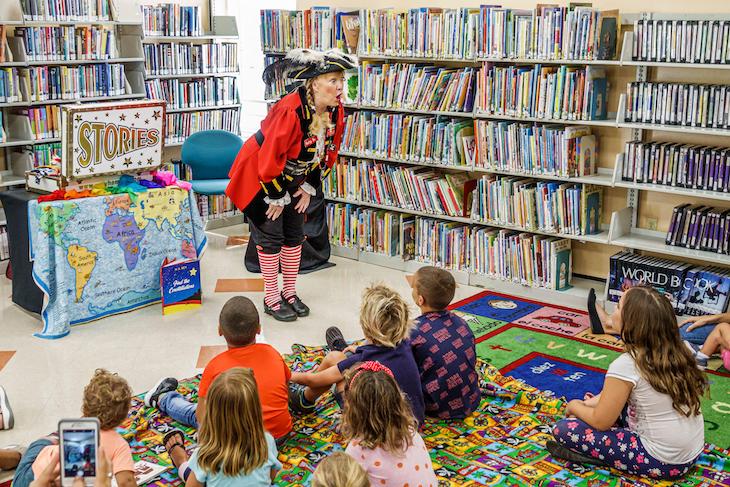Beside me, children sing the ‘Hokey Cokey’. I subconsciously put my left foot in – and out – under the desk, where I face an empty page. Willing concentration to return, I turn to a tried and tested method: staring out of the window. The small garden is a stage for white butterflies that flutter in the vista, ringing in the cyclical changes viewed from this spot. Snowdrops, daffodils, dandelions, grasslands, mud.
The library was the last refuge of those in need of peace and quiet; now, the apple has been plucked from the tree
‘Woah, the hokey cokey cokey!’ The sharply increased volume makes me physically jump. To my right, a man grimly adjusts his headphones and swigs from a flask. Now, five little speckled frogs were sat on their speckled log. A toddler scoots past, crying, followed – eventually – by a harassed-looking carer. ‘Eating some most delicious grub, YUM YUM’. By this point you may be sympathising with the plight of the working parent, but I am not at soft play or similar. I am in my local library.
The library was the last refuge of those in need of peace and quiet; now, the apple has been plucked from the tree. We can blame smartphones, social media – and a strange phenomenon whereby users must take calls via loudspeaker rather than hold the device to their ear. There are few places in towns and cities where you can escape noise. Taking public transport is a minefield of other people’s TikTok reels, performative work calls and, memorably, porn sites. In the woods, too, where I walk regularly, I was listening to the first chiffchaff of the season when a septuagenarian lady ambled by with her audiobook blasting from the phone speaker. I felt it was my civic duty to inform her of the invention of headphones.
It was recently revealed that more than 180 UK council-run libraries have closed or been handed over to volunteer groups since 2016. Around 950 libraries – a third of those remaining – have reduced their opening hours over the past eight years. As Philip Hensher of this parish points out, most of the journalists writing tender-hearted pieces bemoaning this development and claiming libraries are ‘more than just books’ clearly haven’t actually stepped through the door of a public library in years. If they had, they would know that because of this absurd notion, books are now second-rate citizens in libraries. And as for a quiet space in which to read them, forget it.
I have always spent a lot of time in libraries. It started with the little square of carpet ensconced in shelves, where tame teachers would allow the less outdoorsy to hide during games lessons. All my GCSE and A Level revision was done in Reading’s central library, where, on the third floor, staff would berate anyone who broke a whisper, let alone if they were seen with a water bottle out of a bag.
Local libraries are essential for those, like me, for whom homeworking is not always possible and hiring an office is not financially viable. (I’m not alone – the desks are in near-constant use.) One expects a certain level of hustle and bustle from a cafe. But the library? Rhyme time – the early years singing club – takes place three times a week. There’s also stitch and chat, Lego club, and turn up and play. In winter there is a rack of complimentary coats for those who need them. A sign advises that takeaway coffee, muffins and bananas are fine to eat, but tea, burgers and pizza are not. (This distinction is less clear than its designer might have thought.) Bizarrely, tampons and sanitary ware are made available but when I, an actual menstruating women, needed to use the loo, I was informed they were only for rhyme time attendees. Meanwhile, my local village hall is under threat of closure because it can’t get enough community group usage.
Hurrah, then, for the reading rooms in the British Library, where nothing other than a pencil, notepad and laptop is permitted (transported in a clear plastic bag), and where everyone is there because they want to work in silence. (Possibly this is what people mean by finding their ‘tribe’, although obviously we’ve never shared a conversation.) The other floors of the building are filled with remote workers, many of whom do not have a dedicated quiet work space at home and, as hybrid working becomes the ‘new normal’, are forced to find somewhere where they are not spending half their wages on flat whites. In between these deliciously productive sessions, I return to my local library, where one person is painting their nails and rhyme time is in full flow. Knees bent, arms stretched, rah rah rah.







Comments